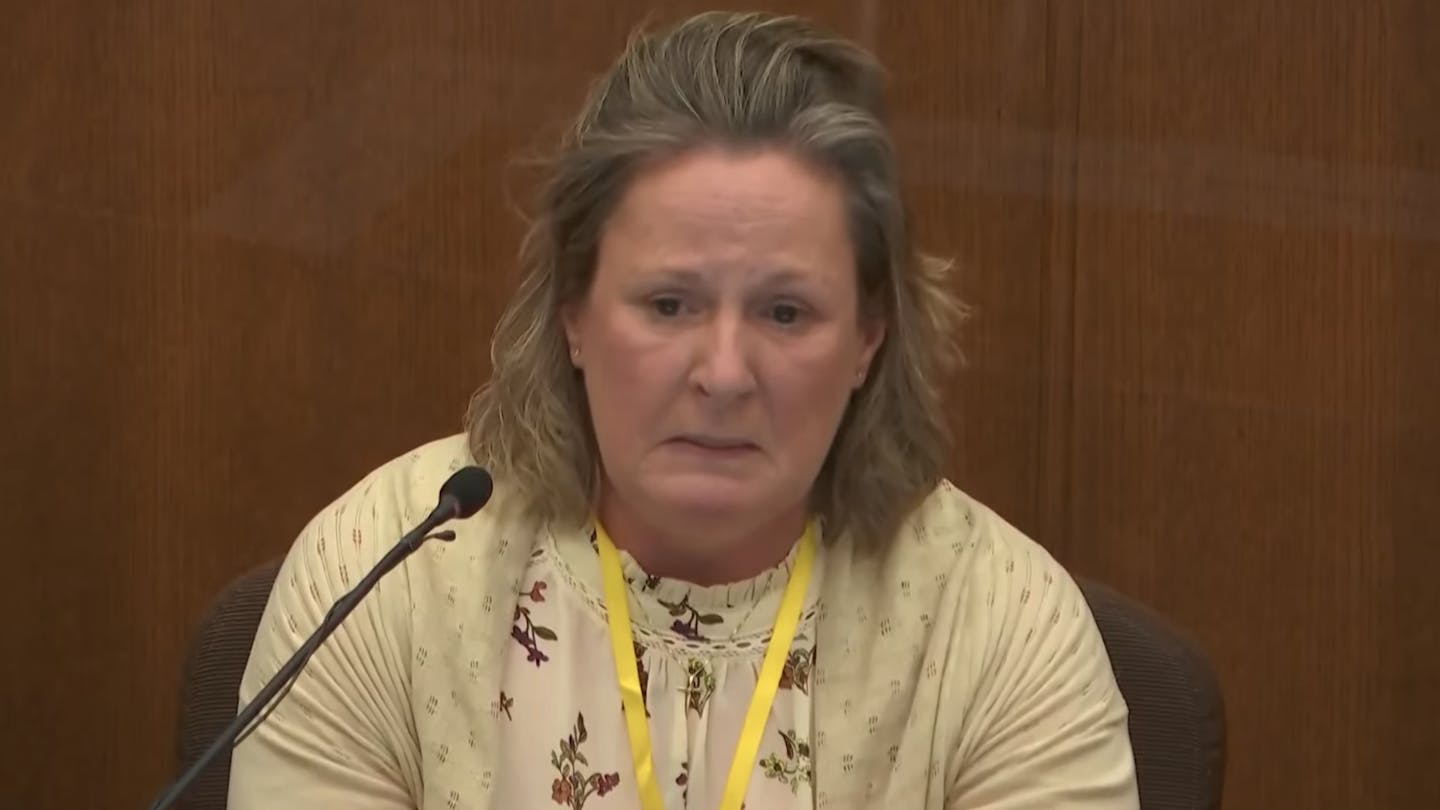Former police officer Kimberly Potter's emotional recounting on the witness stand of how she shot Daunte Wright during a traffic stop drew starkly different reactions from community activists, former law enforcement officials and attorneys watching the case.
Some saw a cynical acting performance meant to elicit jurors' sympathy. Others saw a genuine outpouring of distraught emotion.
"I think Kim Potter is doing everything she can to save herself," said Toshira Garraway, founder of Families Supporting Families Against Police Violence. "I don't feel it was authentic, and I don't think she has considered the pain that she's caused [Wright's] family to feel."
Former Hennepin County Sheriff Rich Stanek said Potter's testimony showed she was remorseful. "She was visibly shaken," he said. "She seemed candid. ... I thought she was genuine."
It was first time since Wright's death on April 11 that Potter has spoken publicly, and her testimony brought some of the most dramatic and surprising moments of the trial. She broke down repeatedly as defense attorneys questioned her about details of the shooting, and there was no clear consensus as to whether her testimony helped or hurt her in a case tinged with racial overtones.
Ted Sampsell-Jones, a professor at Mitchell Hamline School of Law, said Potter probably helped herself. "I think the main point of her taking the stand is to show the jury that she is human — she's not Derek Chauvin, and she's not a monster," he said.
Chauvin, the former Minneapolis police officer who was convicted of murdering George Floyd by kneeling on his neck for more than nine minutes, did not take the stand in his defense during his trial this year.
To Sampsell-Jones, it wasn't the details of what Potter said but how she came across. "She is very relatable as a human, a Minnesotan, a wife, and a mom. She seems like a good person and a good cop who made a terrible, tragic mistake," he said.
He said Potter seemed sincerely remorseful and "when jurors see someone like that, it's not someone they want to punish."
A.L. Brown, a St. Paul-based criminal and civil litigator, came away from Potter's testimony thinking she was genuinely "remorseful and traumatized" at times and at others she was "straight-up playing us."
"It's difficult because you have to acknowledge there is a certain level of tragedy involved in a case like this where the killing was unintentional," he said.
Al Berryman, former president of the Minneapolis Police Federation, said he thought Potter's breakdown was "real." "I don't think for a minute she meant to kill anyone because of their color," he said. "I come to the conclusion it was a bad mistake, she didn't intend to do it."
Trahern Crews, lead organizer for Black Lives Matter Minnesota, said he though Potter showed no remorse for Wright's death and he believed her expressions of emotion were not sincere. "I think it was very rehearsed," he said.
Michelle Gross, president of Communities United Against Police Brutality, called Potter's testimony "a theatrical performance to save her own neck." She said it was "disgusting" that Potter testified she would not have pulled over Wright, who had unexpired license tabs, but allowed the new officer she was with to do it, as a training exercise.
Closing arguments, which are scheduled for Monday, will be critical, especially for the prosecution, said Brown, the attorney. "If they treat this like they've got another life to vindicate, regardless of Kim Potter's remorse, then they've got a chance" at a conviction, he said.
Brown said it comes down to: "Whose life is worth more?"
"This is what people mean when they say Black Lives Matter. When it came to Justine Damond, it wasn't even close," Brown said. Former Minneapolis police officer Mohamed Noor was convicted of Damond's 2017 killing after she called 911 about a possible sexual assault in her neighborhood and Noor fired on her as she approached his patrol car. Damond was a white woman.
Stanek, the former sheriff, said he thought Potter revealed herself as "a police officer, but ... also a human. She's a mom, a colleague."
Garraway drew a different conclusion. "She wants everyone to have empathy for her, but she didn't have empathy for Daunte," she said "There is always a reason, an excuse. for killing our Black men."

'Safe recovery sites' would offer syringes, naloxone and more to people using drugs. The plan could be in peril.
New Minnesota GOP leaders seek peace with party's anti-establishment wing

Who is Republican Lisa Demuth, Minnesota's first House speaker of color?


